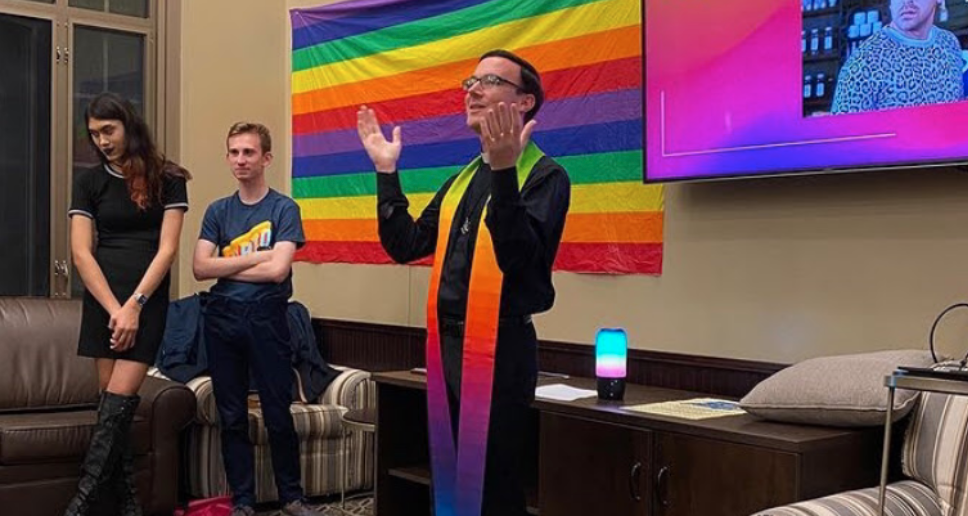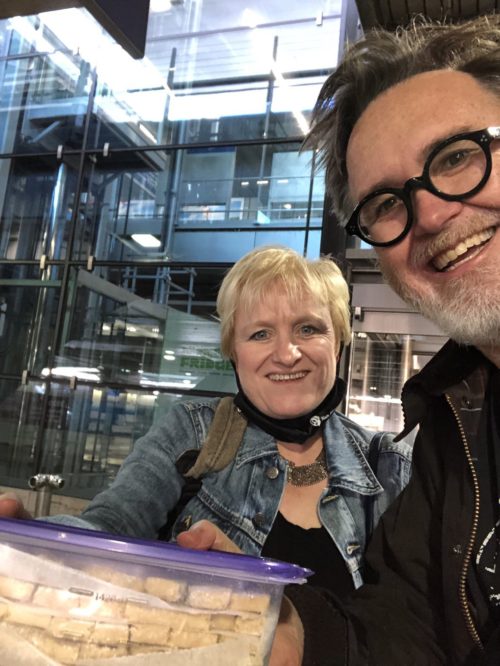Gods Of This World

Good afternoon from suburban Chicago, where I’m here for the annual Touchstone conference. I think you can still come if you want to — register here. Don’t come to hear me, or Carl Trueman, or Hans Boersma, or Tony Esolen, or Allan Carlson, or any of the other speakers. Come to meet Catriona Trueman, Carl’s wife. She makes the very best shortbread on this planet — which I say without fear of contradiction. Carl sent me some a while back, and I could not believe how delicious it was. Catriona came to this conference with Carl, and lo, I met them on the sidewalk waiting for our rides! She brought me shortbread!

I’m holed up in my hotel room trying to get caught up on e-mail and blogging, and eating shortbread like it was lembas. You come to this conference, and you get to meet Catriona, and try to talk her out of the recipe.
Carl tells me sales of his great book The Rise And Triumph of the Modern Self have been terrific. This is well-deserved; I think it’s one of the most important books of our time. This book really does provide the key for understanding the disorders of our era. When you read that book, you realize how off-base some of our most heated culture-war controversies are. By “off-base,” I don’t mean that they aren’t real. They most certainly are real. What I mean is that we social and religious conservatives are reacting to symptoms of a much deeper problem. Funny, but on the flight up from Baton Rouge, I was re-reading Modris Ekstein’s invaluable cultural history Rites of Spring: The Great War and the Birth of the Modern Age. It’s a great companion to Carl’s book, because both discuss how the West has been dismantling itself for a very long time now, in the name of liberating the Self. These lines are powerful:
Diaghilev’s ballet enterprise was both a quest for totality and an instrument of liberation. Perhaps the most sensitive nerve it touched—and this was done deliberately—was that of sexual morality, which was so central a symbol of the established order, especially in the heart of political, economic, and imperial power, western Europe. Again, Diaghilev was simply an heir to a prominent, accumulating tradition. For many intellectuals of the nineteenth century, from Saint-Simon through Feuerbach to Freud, the real origin of “alienation,” estrangement from self, society, and the material world, was sexual.
“Pleasure, joy, expands man,” wrote Feuerbach; “trouble suffering, contracts and concentrates him; in suffering man denies the reality of the world.”
The Sexual Revolution of the 1960s had actually been underway for all the twentieth century, and some years before. There is no avoiding the conclusion that Philip Rieff would draw later: if you lose sexual restraint as a civilizing principle, you lose Christianity (and more besides).
It’s a dour conclusion, I suppose, but it happens to be true. Mary Frances Myler is an undergraduate at the University of Notre Dame, and in this article from a student newspaper, she calls out the Catholic university’s leadership for surrendering the Church’s teachings on sexuality to appease the Zeitgeist. Excerpts:
This past June, the university announced its first ever celebration of Pride Month. The diversity and inclusion page of the university’s website published an article which draws exclusively upon President Biden’s “Proclamation on Lesbian, Gay, Bisexual, Transgender, and Queer Pride Month, 2021” in an effort to “raise awareness about efforts for equal justice and equal opportunity for the LGBTQ+ community” during the month of June. The article directs curious readers to the website of the Human Rights Campaign, the largest LGBT advocacy group lobbying organization within the United States, for information on “what it means to be an ally in the effort to achieve equality for all.” The article does not allude to the Catholic Church or her teachings in any way.
Just this week, on October 11, PrismND (Notre Dame’s official LGBTQ+ undergraduate organization) and Baumer Hall co-hosted a “Coming Out Day Celebration.” Fr. Robert Lisowski, C.S.C., rector of Baumer and recently-ordained priest, attended the event wearing a rainbow stole which matched the pride flag hanging on the wall directly behind him. When asked for comment on his involvement with the event, Fr. Lisowski told the Rover, “My presence at this event was simply to affirm, support, and celebrate the dignity of every human person as a child of God. We prayed in gratitude for the unique gift that every person is [and] for an end to discrimination.”
Other erosive occurrences disclose the university’s adherence to secular standards set by the LGBT movement. The home page of the ND Student Government website displays a picture of the student government executives in front of a pride flag. The College of Arts and Letters now accommodates students’ preferences for the use of singular “they/them” pronouns in news articles. And this fall, Notre Dame Press published the book Gay, Catholic, and American written by Greg Bourke, who was a named plaintiff in Obergefell v. Hodges (2015), the decision that legalized same-sex unions nationwide.
It goes on. More:
Properly nuanced, the Church’s teachings on sexuality are simple. In light of Catholic doctrine, Notre Dame should recognize the incoherence of her current position. Her current approach confuses, rather than models, Church teaching. In order to resolve her current incoherence, the university must choose between two conflicting views—one Catholic, the other secular.
The implications of this choice are dramatic; each departure from doctrine erodes the Catholic character of the university. If the university adheres to secular standards on LGBT issues, what else will she be willing to surrender? When truth capitulates to untruth, what shall stand?
Exactly right. How is it that a Notre Dame undergraduate understands this, but Father John Jenkins, the university’s president, does not? As Mary Frances Myler points out, all Notre Dame undergrads are compelled to go through “Welcome Week,” which emphasizes “allyship” — which is to say, the University of Notre Dame trains its students if not to defy Catholic teaching on LGBT, then to be thoroughly confused about what it is and what that requires of them as Catholics.
What bad leadership all of us small-o orthodox Christians have right now from most of our elites! They don’t seem to understand the crisis at all. Carl Trueman lays into Evangelical elites in a recent First Things essay. Excerpt:
Last year I taught a class in historical method at Grove City College. One of our texts was Marsden’s The Outrageous Idea of Christian Scholarship. The students’ response to the book was striking. Though they saw Marsden as a thoughtful and engaging writer, they considered his argument—that Christians could find a place at the academy’s table by being good scholars and treating colleagues with respect—unpersuasive in the present context. No student today thinks that a professor in any discipline at a research university who is polite and respectful to a gay colleague will also be allowed to voice his objections to gay marriage. That is not how the system works anymore.
My students have an accurate view of reality. Today’s cultured despisers of Christianity do not find its teachings to be intellectually implausible; they regard them as morally reprehensible. And that was always at least partially the case. This was the point missed by Noll and Marsden—though it may not have been as obvious at Wheaton College or the University of Notre Dame in the nineties as it is almost everywhere in higher education today. Our postmodern world sees all claims to truth as bids for power, all stable categories as manipulative—and the task of the academy is to catechize students into this orthodoxy. By definition, such a world rejects any notion that scholarly canons, assumptions, and methods can be separated from moral convictions and outcomes. Failure to conform to new orthodoxies on race, morality, sexual orientation, and gender identity is the main reason orthodox Christianity is despised today. These postmodern tenets rest upon cultural theories that cannot accommodate Christianity, precisely because they underwrite today’s academic refusal to discuss and weigh alternative claims. To oppose critical race theory or gender theory is to adopt a moral position that the culture’s panjandrums regard from the outset as immoral. The slightest hint of opposition disqualifies one from admission to polite society.
Trueman’s overall point is that there is no place to hide anymore: if you are a believing orthodox Christian, the world really does consider you to be the Enemy. It’s the end of winsomeness as a strategy for acceptance.
This Touchstone conference theme is “No Neutral Ground: The Cost of Discipleship In A Secular Age”.For the next two days, we are going to be talking seriously about how faithful Christians should live here in the post-Christian, and increasingly anti-Christian, world. If you are prepared to capitulate to the world, this conference is not for you. If not, well, if you can get here, come on!
Let me also commend to you Ephraim Radner’s First Things piece about the kind of theology we will need in this new Dark Age. It’s pretty much the same theology we needed during the last one. Excerpt:
Theological work in the Dark Age ahead will need to learn from the Dark Age behind. It must be stripped down and focused on the Scriptures’ invitation to bring the apostolic world into the present, and not be “updated,” but rather “backdate” our spiritual imaginations. Brown writes of Gregory the Great’s “austere assumption that there was only one permanent and all-important object on which the human mind could always work”: the “raw stuff of human nature” brought to a place of “transparency to God.” Theologians, like the rest of the world, are holding on to far too much. “Much of the comfort and richness of a culture could and should be sacrificed to that one overriding aim.” Lest we also forget, that should be our goal, too.
Over at my (subscription-only) Substack newsletter, I’ve been speculating on why Orthodox parishes in the US have been receiving an unusual number of inquirers during Covid. I think Radner’s point in that paragraph explains it. People understand that the times are evil, and growing darker. They know they need something deep, real, and rooted firmly in the Fathers.
Subscribe for as little as $5/mo to start commenting on Rod’s blog.